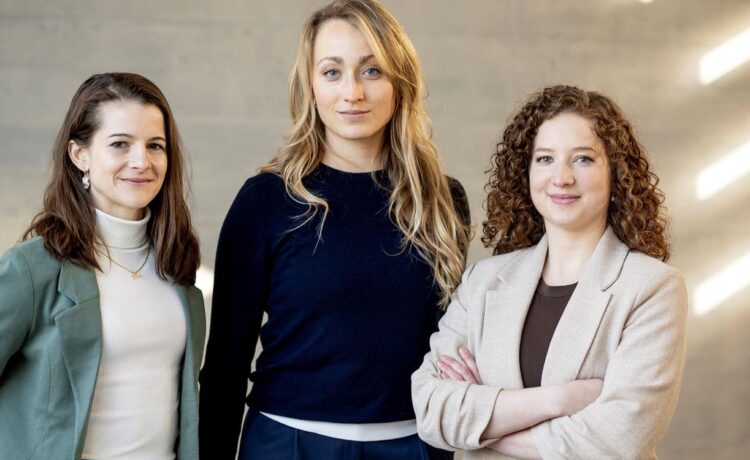Sallea founders Dr. Nicole Kleger, Anna Bünter and Simona Fehlman
Not many markets go from being worth pretty much zero to more than $370 billion in the space of just 10 years. However, that’s the growth predicted for the cultured meat industry – prompting huge interest from global food companies. One business hoping to ride that wave is Sallea, a Swiss start-up, that is today announcing the completion of a $2.6 million funding round.
For now, cultured meat, grown in a laboratory, is in its infancy, with only a handful of countries having given regulatory approval for its sale – notably, the US, Singapore, Israel and the UK. However, food and drug regulators all around the world are currently examining multiple applications from cultured meat companies hoping to sell their products to consumers – some targeting the pet foods market, but many more focused on human food.
Advocates for cultured meat point to environmental advantages over rearing livestock – it requires much less land, uses less water and produces less pollution and fewer emissions. Products contain cells originally harvested from live animals, but this is arguably very different to rearing livestock for slaughter; some people argue cultured meat products are suitable for vegetarians and vegans.
The race is therefore on to produce cultured meat at scale, with products that look, smell and taste like real meat, right down to their texture. Enter Sallea, which was launched in November 2023 by founders working with materials science technology they began researching at ETH Zurich, the Swiss university.
“Cultivated foods have been limited to sausages and minced meat, but our technology has the potential to kick-start cellular agriculture by accelerating time to market and lowering the production costs for cultivated whole cuts such as steaks and fillets,” explains Simona Fehlmann, CEO and co-founder of Sallea.
The company, which Fehlmann launched with colleagues Dr Nicole Kleger and Anna Bünter, doesn’t intend to sell the finished product. Rather, it has developed “scaffolds” that producers will use as the framework for their cultivated meats. These scaffolds are constructed from plant cells and provide a porous, three-dimensional grid that provide the foundation for textured steaks, fillets and other cuts.
“We see our technology as ideal for the second-generation cultivated meats that producers hope to bring to market,” Fehlmann explains. Producers will be able to use Sallea’s scaffolds to tailor the size and shape of their cultivated meats, as well as the nutritional profile.
Such products will enable cultured meat producers to compete with goods such as plant-based meat alternatives – and to really kickstart the growth of the sector. A study by Grandview Research estimates the industry will grow at a rate of almost 52% a year between 2023 and 2030, taking its total value past $370 billion.
Sallea has already begun working with a number of food producers to develop testing and proof-of-concept projects. Fehlmann expects it to be another four or five years before cultured meats using the company’s technology are available on supermarket shelves – much of that time will be devoted to regulatory approvals for the end products. But Sallea will be able to monetise its technology more quickly, selling to producers as they develop their lines.
Today’s fundraising announcement underlines investors’ interest in the cultured meats space and provides the company with additional headroom as it scales up and develops its product further. The round is led by Founderful, with participation from Kost Capital, and takes the total amount of cash raised by the company to around $4.4 million.
Antonia Albert, principal at Founderful, says: “Sallea unlocks the potential of cultivated meat, paving the way for a sustainable, cruelty-free future.” At Kost, meanwhile, general partner Bodil Sidén praises Sallea’s “groundbreaking technology aimed at setting a new standard in sustainable meat production”.
Food producers are also excited by the company’s potential. “While the potential of cellular agriculture is clear, scaling it effectively demands not only capital and expertise but also innovative solutions like Sallea’s,” says Robin Matthew, CEO of Elsa-Group, a leading group in the Swiss dairy and alternative protein industry.
“With cultivated meat now regulated and consumed globally, the industry is poised for its next evolutionary leap,” adds Dr James Ryall, a former chief scientific officer at cultured meat company Vow. “Sallea’s edible scaffolds not only open the door to premium cultivated meat products with superior texture, but also significantly lower production costs, offering consumers a wider range of high-quality, sustainable protein options.”
















